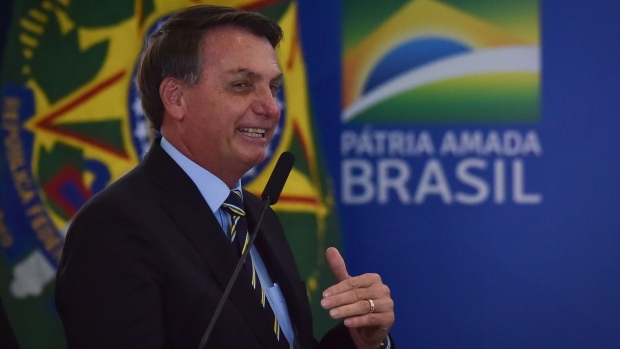Jul 2, 2020
Cornered by Crises, Bolsonaro Adopts ‘Peace and Love’ Style
, Bloomberg News

(Bloomberg) -- After pushing his administration to the brink of an institutional crisis with Brazil’s congress and its top court, President Jair Bolsonaro is seemingly changing tack, heeding the advice from new allies and even his predecessor.
For almost two weeks now the far-right president has put his belligerent style aside to build bridges with the country’s top lawmakers and Supreme Court justices. With the coronavirus pandemic tearing through Brazil and the economy nosediving, legal problems involving Bolsonaro’s inner circle have forced him to rethink his strategy in a bid to shield the government from simultaneous crises, according to officials and senior legislators.
The new style, dubbed “peace and love” by the local press, may not last long. It is mainly a strategy to weather the political storm created by Supreme Court-authorized investigations into the president himself, his sons and key supporters, according to those people, some of whom requested anonymity as they’re not authorized to speak publicly.
Faced with multiple crises, the president became more open to listen to new allies from centrist parties, whose members include some of the most experienced Brazilian politicians, and even to former President Michel Temer. After sporadic contacts over the past two months, either directly or through presidential aides, Bolsonaro called Temer directly when relations with the top court deteriorated.
“I reiterated what I have been saying in interviews, that his participation in demonstrations for the shutdown of congress and the top court isn’t worth it, doesn’t add anything and only causes problems,” the former president said in an interview, adding that he also advised Bolsonaro to rely more on congress to govern. “I hope my advice, my tip, may have helped.”
Read More: Old Foes Become Bolsonaro’s Best Shield Against Impeachment
While it’s unclear how much this conversation influenced his decision making, Bolsonaro has made a series of conciliatory gestures since then. He appointed as his communication minister Fabio Faria, a leader of the group of centrist parties. During his swearing-in ceremony, Faria talked about a “patriotic armistice” between the three branches of power. He quickly became one of the president’s top aides who’s helping to shape his new style, according to one of the people who requested anonymity.
More visibly, Bolsonaro has refrained from showing up at rallies against democratic institutions, bullying governors who impose quarantines during the pandemic, or clashing with journalists in front of the residential palace in Brasilia. Constant diatribes against the Supreme Court, a feature of his political career, have also disappeared.
Bolsonaro’s office didn’t comment on this story, nor on the conversation held with Temer.
Probes Close In
A number of probes are closing in on Bolsonaro and his inner circle, but two of them have hit the government particularly hard.
Late in May, the Supreme Court launched investigations into some of Bolsonaro’s most radical supporters who are accused of spreading fake news against government enemies, threatening the very way the president rallies his base. Three weeks later, police arrested Fabricio Queiroz, a former policeman accused of handling illegal business for one of his sons in Rio de Janeiro. Bolsonaro and his family have repeatedly denied wrongdoing in both cases.
“Bolsonaro is very much cornered by Supreme Court actions against radical supporters and by the Queiroz case,” said Marcelo Ramos, a lawmaker from a center-right PL party that has recently entered into an alliance with the government.
Read More: In Hunt for ‘Office of Hate,’ Brazil’s Supreme Court Closes In
The president also faces a separate probe into allegations made by his former justice minister that he tried to interfere in the federal police. Meanwhile, congress is moving to crack down on fake news, with the senate this week approving a bill that imposes strict rules on social media companies.
In a bid to mend relations with the top court, Bolsonaro forced one of his most vocal supporters, then-Education Minister Abraham Weintraub, to step down after repeated clashes with justices. As replacement, last week he named Carlos Alberto Decotelli, who would be Bolsonaro’s first Black cabinet member.
While the appointment quickly backfired after revelations of inconsistencies in Decotelli’s resume, forcing to his resignation on Tuesday, the move was another example of Bolsonaro trying to add more moderate voices to the cabinet.
Also this week Bolsonaro joined the heads of both houses of congress, who had been at odds with him, at an event to announce the extension of emergency payments for informal workers during the pandemic. The president said the meeting was a “sign that together we can do a lot for Brazil,” and invited them to accompany him on trips around the country.
How Long?
Yet the big question in Brasilia these days is how long this truce will last. At the end of the day, Bolsonaro’s notoriously confrontational strategy not only got him elected in 2018, but has been crucial to maintaining a loyal support base that has kept his approval rating above a 30% threshold over the past few months, even as the coronavirus crisis unfolded and economic activity collapsed.
Ramos, the lawmaker, predicts Bolsonaro’s peaceful style will last “while he is in a fragile position,” meaning the president may return to his combative self once his political standing strengthens. In the meantime, legislator Silvio Costa Filho, whose Republicanos party has also entered into an alliance with the government, warns Bolsonaro won’t be able to run the country if he returns to his old ways.
“It would be great if he could control himself,” he said.
Two of the officials speaking on condition of anonymity and who are close to him said they don’t expect the cease-fire to last long. One of them, who shares more of his ideological views, said Bolsonaro is a fighter who can’t go against his antagonist personality.
©2020 Bloomberg L.P.






